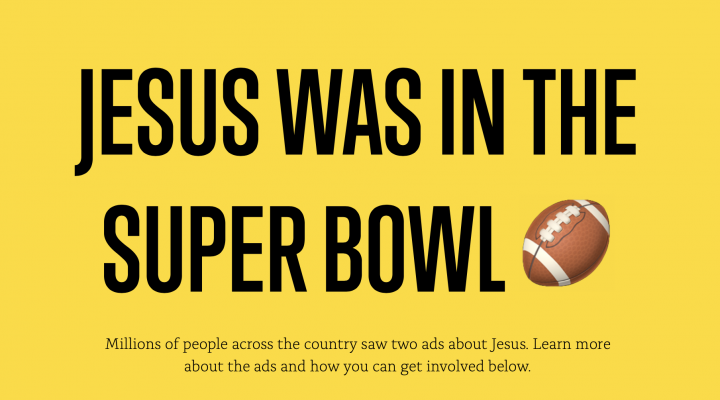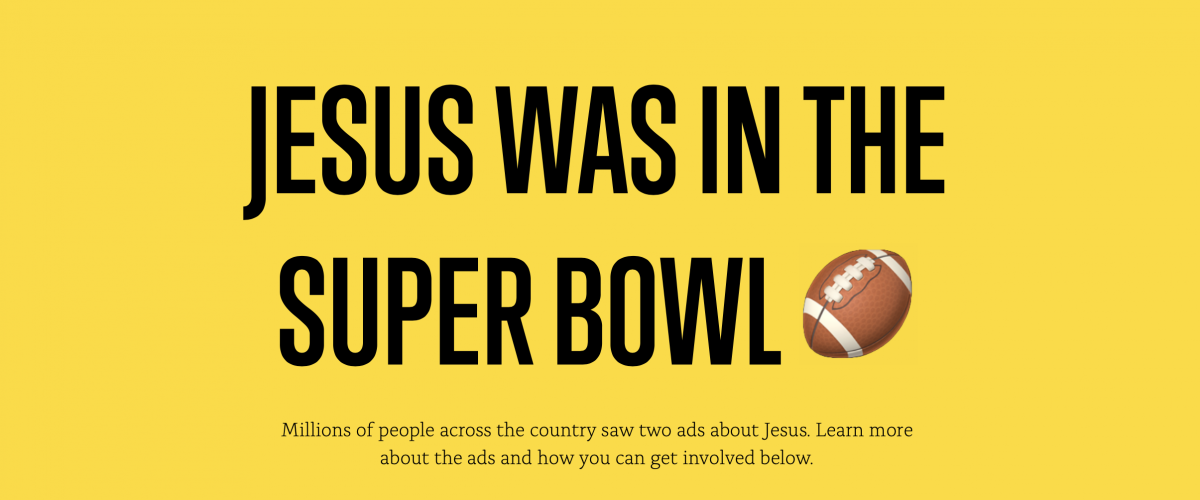“He Gets Us,” the “biggest faith-related campaign in history,” showcased two commercials at this year’s Super Bowl. But it’s what’s happening after the ads that really matters for the campaign’s creators and backers.
While capturing the attention of 113.1 million viewers was vital, converting that attention into website traffic is the real goal.
The big donors behind the multi-billion-dollar He Gets Us campaign, primarily members of the Servant Foundation, claim to be just a collection of “Jesus fans and followers” who can’t understand how his message of peace and love became associated with “hate and oppression.” They insist their purpose is to use “the authentic Jesus of the Bible” to unite a country divided by culture wars.
However, behind the website lurks another agenda — one that relies on the cooperation of churches.
Reminder of the back story
Previously, Baptist News Global published part one in this series, explaining the people behind the campaign. One of those is Bill McKendry, whose company designed He Gets Us. McKendry was approached by members of the Servant Foundation who said they were concerned that the Southern Poverty Law Center was “labeling Christian groups” like Focus on the Family and Alliance Defending Freedom as “hate groups because of their stances on same-sex marriage.”

Jason Vanderground
Jason Vanderground, a spokesman for the campaign, confirmed this: “Influential Christians were becoming concerned … that there was an association there with white Christian nationalism. And what’s happening is that dynamic is creating a lot of negative cultural public policy legal implications.”
The Southern Poverty Law Center has not labeled Focus on the Family a hate group. This is an untruth spread by those who want to accuse the SPLC of being “anti-Christian.” The Alliance Defending Freedom, however, has been labeled a hate group for supporting recriminalizing same-sex relations and promoting anti-transgender legislation.
In 2021, the Servant Foundation donated almost $17 million to ADF and more than $50 million to the National Christian Foundation, a donor-advised fund that in 2019 gave to 23 organizations listed as hate groups by the SPLC. Foundation member David Green, co-founder of Hobby Lobby, is a known Christian nationalist who independently gives to the National Christian Foundation on top of his contributions through the Servant Foundation.
“It appears these influential Christians want the right to hate without publicly being labeled a hate group.”
It appears these influential Christians want the right to hate without publicly being labeled a hate group by the SPLC, an organization McKendry acknowledges is “the standard for Facebook, Instagram, New York Times, Washington Post, all major media, all major academia on who is a hate group and who isn’t.”
Rather than examine their actions and beliefs and how these may have hurt others and negatively influenced Americans’ opinion of Christianity, the donors behind He Gets Us want to change how evangelical conservatives, such as themselves, are perceived. Thus the campaign appears to be more about rebranding than repentance.
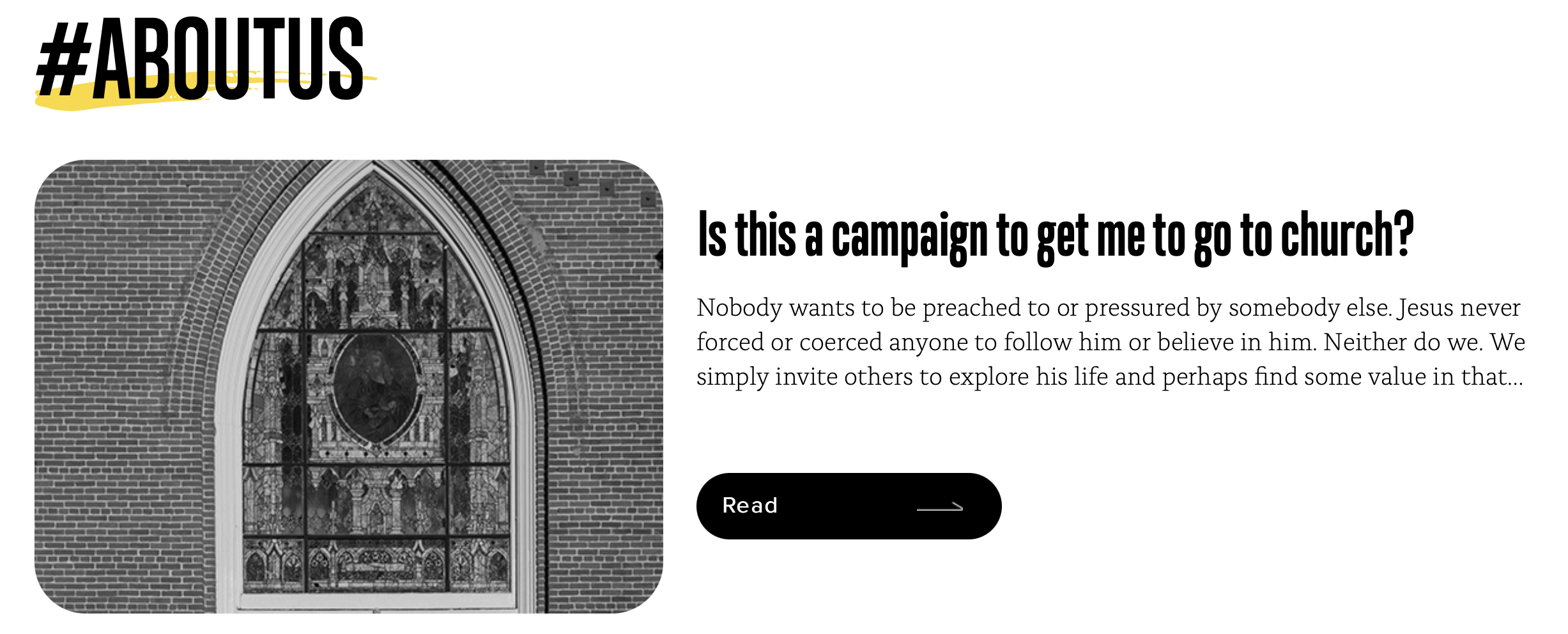
Joining ‘the movement’
This rebranding is directed first at individuals in crisis looking for answers and second at churches motivated to join “the movement.”
When it comes to appealing to individuals, the campaign is targeting religious skeptics and cultural Christians. Together these audiences comprise 54% of the country’s population.
That’s enough to move public perception, Vanderground explained. “Here we have 54% that can be persuaded to one side or the other.” Those behind He Gets Us hope the commercials featuring a modern, relatable Jesus will lure what Vanderground calls the “movable middle” to the website where they can connect with churches and organizations that agree with the Servant Foundation’s theological, cultural and political worldview.
Website visitors, referred to as “explorers,” have several options for connecting with the campaign through hegetsus.com. There is an option to pray or chat in real time with volunteers, opportunities to join a group Bible study organized by Alpha USA, and devotional readings offered through YouVersion, a popular devotional app developed by Life.Church.
“Explorers” seeking in-person connections can fill out an online form, which is then forwarded to a local partnering church. According to a presentation from 2022 for the Assemblies of God churches in Montana, He Gets Us has received more than 10 million prayer requests and connected more than 99,000 people with churches.
If He Gets Us is the “air game,” then Gloo is the “ground game.”
A church, network, individual or denomination can become a “partner” at the campaign’s companion website, hegetsuspartners.com. A presentation for Methodist leaders in North Texas boasted that partnering is like “having an outreach minister on staff without having to hire new staff.”
Overwhelmed and under-resourced pastors and laity no longer need to worry about journeying out into the community to be “fishers of men.” He Gets Us promises to deliver the catch directly to them. And they do this through a tech company called Gloo.
According to Vanderground, if He Gets Us is the “air game,” then Gloo is the “ground game.”
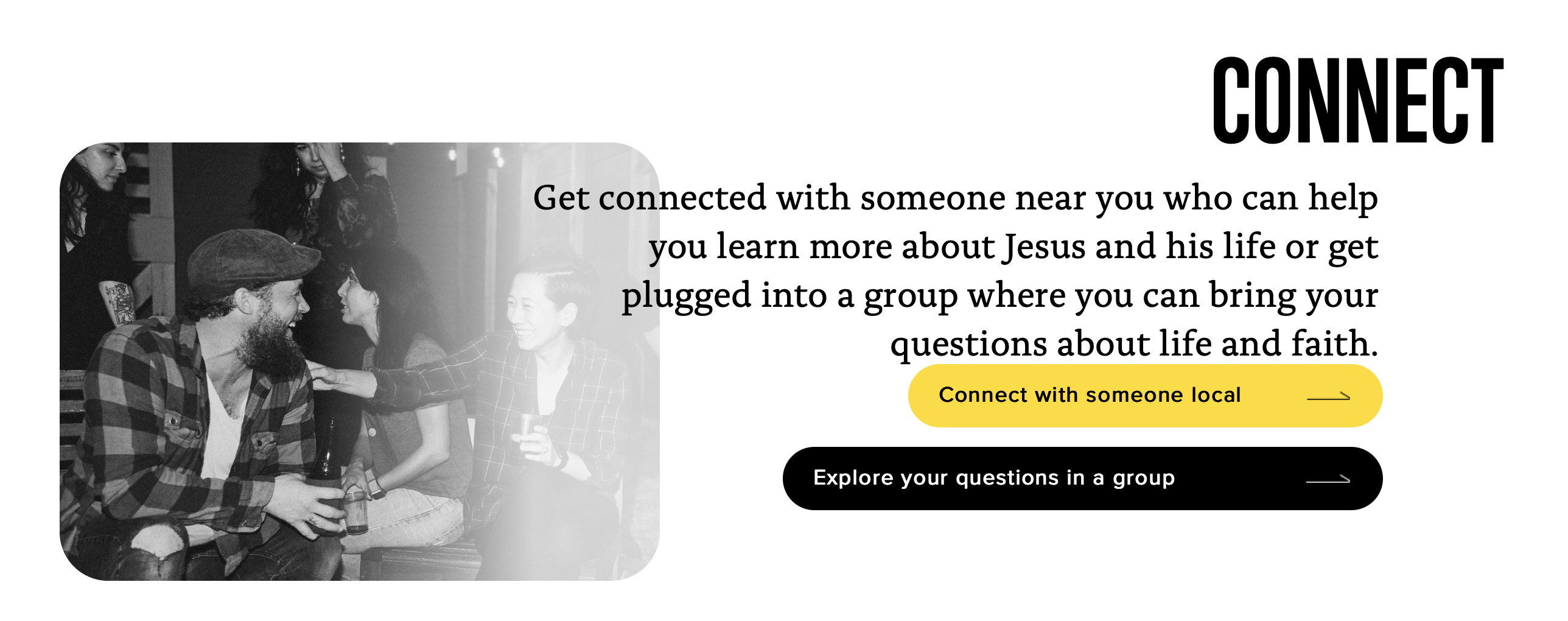
How it works
When a pastor logs in as a partner, he or she is routed from hegetsuspartners.com to Gloo’s website. There, He Gets Us is just one of many outreach campaigns churches can join that will send potential members their way. In what’s known as “cooperative advertising,” Gloo posts the various campaign ads on social media and then distributes the responses to partner churches based on their ZIP Codes.

Scott Beck
Gloo founder Scott Beck explains it this way: “If someone searches for divorce, rather than having an ad for a divorce lawyer appear, there will be an ad that says, ‘Restore Your Marriage’ along with an invitation to connect to a church.”
Gloo’s partner churches, sometimes referred to as “champions,” can track the progress of campaigns in their communities and “see clearly into the hearts and minds of your people with powerful assessment tools.”
After uploading member information, pastors can use Gloo to send church-wide texts soliciting prayer requests or email members a “Couples Check-In” assessment.
In addition to Barna, Gloo also provides resources from organizations it designates “outreach partners” and “equipping partners,” such as Cru, Church Fuel, the American Bible Society, Alpha, and Harper Collins. Normally technology like this would be beyond the budget of the average church, but thanks to “scholarships” provided by “kingdom-minded donors” these services from Gloo are free, at least for the moment.
“It is well worth exploring what Gloo does with all this personal data and who has access to it.”
With in-person attendance in decline and so many churches struggling, resources like these could be a real boon to ministry. But as with all online services that are offered free of charge, it is well worth exploring what Gloo does with all this personal data and who has access to it.
And other questions arise: Who are these “kingdom-minded donors?” And where does the Servant Foundation fit in? A closer look reveals that behind the websites is a web of interconnected individuals and organizations intent on transforming church attendance into political gain.
The money trail
The money trail begins with the Philanthropy Roundtable, a conservative organization that doles out donations to right-wing causes and works tirelessly to keep dark money in the dark. Contributors include the Mercer family, Koch Brothers, and the Bradley Foundation, one of the biggest backers of Donald Trump’s Big Lie.
Philanthropy Roundtable also supports the National Christian Foundation. In 2014, Philanthropy Roundtable created the Culture of Freedom Initiative under the leadership of its then-Executive Vice President J.P. DeGance. DeGance worked as a self-described “political hack” for the Koch brothers on special projects using data to find people who were persuadable voters. The COO of Culture of Freedom Initiative, William Hild, also worked for the Kochs in a political capacity.
COFI provided some of the funding to develop Gloo with the approval of Chairman of the Board Mike Leven, who was impressed with Scott Beck’s commitment to stopping “the secularization that’s been going on and destroying our country from the inside.” Leven also is an Advisory Council member at Turning Point USA and was Republican mega-donor Sheldon Adelson’s right-hand man. Other board members include Sean Fieler, a big donor to conservative Catholic causes, especially around anti-abortion and anti-trans issues, and Republican campaigner Toby Neugebauer.
Together, COFI and Gloo created the Insights data platform for churches, following in the path Cambridge Analytica pioneered using demographic data, combined with psychographic data, to create behavior profiles based on an individual’s personality, beliefs, fears and longings as expressed by “likes” on Facebook. Studies show that with a data set of 300 “likes,” artificial intelligence can predict a person’s personality as well as a spouse or better than friends, colleagues and family.
“Companies like these have anywhere from 2,000 to 5,000 points of data on each the millions of people in their databases.”
Cambridge Analytica — which closed in 2018 amid scandal— used this process to create specialized online ads tailored to the personality profiles of voters. If a voter was fearful of immigrants, that person would see an anti-immigration ad on Facebook, playing up that fear. Additional data for Insights came from i360, a Koch owned and subsidized data company that is the go-to for microtargeting voters among Republican campaigns, conservative nonprofits and groups like the National Rifle Association. Companies like these have anywhere from 2,000 to 5,000 points of data on each of the millions of people in their databases.
Jacksonville a test market
To give Insights a trial run, COFI launched a faith-based marriage program with the help of Baptist churches and Catholic churches in Jacksonville, Fla. COFI’s target audience was cultural Christians experiencing marital stress.
“If you could model swing voters, (then) what would it look like if you found the predictors that indicated people were on the verge of divorce?” asked DeGance. This process of modeling is called “predictive analytics,” and it’s the foundation of modern marketing, whether an organization is selling marriage counseling, a car or a candidate.
Predictive analytics uses data to create a model and then applies that model to a large audience to find other people with similar data profiles. In the Jacksonville trial, Gloo acquired the data of 30,000 divorced couples from a third-party data company. The company then determined what these couples had in common by looking at things such as rate of credit card use, purchases and travel bookings. If a subset of couples all did A, B and C, and then divorced, then other couples who have also done A, B and C are likely at risk for divorce. Gloo applied the model to its own database of 266 million Americans and determined 33 million of them were potentially heading for divorce.
“These social media ads invited couples to the churches’ marriage programs, where members would befriend and mentor them.”
Partner churches in Jacksonville then used Insights to filter that data by location or other factors like financial insecurity, ethnicity or anxiety. COFI financed highly tailored ads targeting the at-risk couples based on their profiles. These social media ads invited couples to the churches’ marriage programs, where members would befriend and mentor them.
Insight’s trial run in Jacksonville was deemed a success, and Gloo rolled out the platform in other cities across the country. COFI changed its name to Communio, installed DeGance as president, and now helps individual churches and diocese do relationship ministry using Big Data. After COFI’s success, DeGance also was made a Gold Circle Member of the Council on National Policy.
Feeding conservative politics
The CNP is the most secretive political organization in the nation’s capital, according to the Washington Post. It was founded in 1981 by evangelical leaders, far-right conservatives and wealthy Republican donors to bring about a “moral rebirth” in American society. The group’s money and members are enmeshed in every facet of conservative politics and culture.
According to leaked membership lists, Mike Pence is a member, as are Ginni Thomas, Steve Bannon, Charlie Kirk (the founder of Turning Point USA), Tony Perkins (president of Family Research Council), the SBC’s Paul Pressler, Conservative Baptist Network founder Rod Martin, Richard Graber (president of the Bradley Foundation), Marjorie Dannenfelser of the anti-abortion Susan B Anthony List, and the president of the ADF, Michael Farris. The Servant Foundation contributes financially to the organization as well.
“The group’s money and members are enmeshed in every facet of conservative politics and culture.”
One other member is Bill Dallas, who heads the nonprofit United in Purpose and was the organizer behind the 2016 closed-door conservative conclave at a Times Square hotel where evangelical leaders swung their support behind candidate Donald Trump.

Bill Dallas
Dallas, with help from evangelical pollster George Barna, created UIP to collect data from conservative churches and then used that data to drum up support for “pro-family, limited government candidates in swing states” by targeting potential Republican voters. In 2020 , UIP focused its energy on a strategy to increase Trump support among conservative Catholic voters and “dormant evangelicals,” those oft-targeted cultural Christians.
United in Purpose partner and CNP member Brian Burch is co-founder and president of CatholicVote, a pro-Trump Catholic group that worked with Steve Bannon to harvest cell phone data from church goers attending mass in 2018. COFI board member Sean Fieler is a major donor to CatholicVote and responsible for building up its database. He also funded a pro-Trump campaign app that, with users’ consent, sends the phone numbers and email addresses of their contacts list to a “third-party vendor, which looks for matches to existing voter file information” to find persuadable voters.
In August 2022, J.P. DeGance created a video for CatholicVote’s education wing EDIFY that referenced Gloo’s Jacksonville trial. Since Fieler and DeGance both were involved in the trial run of Gloo’s Insights platform, it’s troubling that CatholicVote is also using Gloo to strategically target Catholic voters with its conservative messaging.
“It’s troubling that CatholicVote is also using Gloo to strategically target Catholic voters with its conservative messaging.”
When Alexander Nix, founder of Cambridge Analytica, testified before the UK’s House of Commons, the chairman asked if it would be possible to run an ad tailored to likely Republican voters with “strong religious beliefs.” He replied, “Hypothetically it would be possible, if you had enough data, say, on evangelical Christians in America, to have a look at that audience and see if there’s a correlation between that and some political agenda. … There are very large church organizations and religious organizations that might have access to these types of data.”
Marketing to churches as partners
Gloo’s representatives are hard at work promoting their platform to churches, denominations and religious organizations — creating just such a trove of data on Christians in America, although a spokesperson for Gloo said the organization’s Terms of Use explicitly prohibit its data being used for political purposes. In 2021, 30,000 churches, or 10% of the churches in the nation, were using Gloo. Now that the Super Bowl ads have aired and He Gets Us has begun its outreach campaign, that number is sure to be higher.
The United Methodist church highlighted Gloo’s free service on its podcast and featured it as a resource for churches. The SBC Executive Committee created a prayer toolkit for its pastors that relies on Gloo’s texting service and attractive templates to reach out to members. Baptist associations from Arizona to Wisconsin are also partnering with Gloo, as is the Georgia Baptist Mission Board. The Evangelical Presbyterians also have their own resources on Gloo.
When people participate in one of the Barna Group’s surveys like State of the Church or Barna Cities, that information is shared with Gloo. The same is true for assessments like Barna Church Pulse or the Reveal Spiritual Life Survey.
“All these services and surveys generate data about church members, which then becomes Gloo’s property.”
All these services and surveys generate data about church members, which then becomes Gloo’s property. Data on demographics, contact information, search history, sexual orientation, health information, and “information regarding your specific concerns or needs … interests, views, opinions, perspectives, traits or characteristics” are all collected by the company.
So, too, is data on the spiritual struggles of and questions from “explorers” reaching out to connect with churches through campaigns like He Gets Us. Gloo then shares selected data with its partners. Not just ministry partners, but also “scholarship partners or donors,” including perhaps the Servant Foundation and those unnamed “kingdom-minded donors.”
In addition to this storehouse of data, Gloo licenses data (for example, the spending habits of at-risk couples) from third-party vendors that it uses to “enrich” its internal profiles of individuals.
“These other groups like United in Purpose already have so much data. They can tell who is likely to be a drug addict, who is going through a divorce. What they don’t have is what church you go to,” DeGance said. However, with all the data provided by partner churches and denominations using the Gloo platform, they potentially could have access to that information as well.
Prior to the launch of the He Gets Us campaign, Insights+ was available for churches interested in doing even more with their data. Like the churches in COFI’s trial run, customers could analyze data about their community and target residents with relevant advertising. While the website and accompanying demonstration videos remain online, it’s unclear when Insights+ will return.
In a video for the “Gloo Pro Tip of the Week,” a bubbly staffer named Brittany instructed users how to build an audience in the platform by selecting a locale and then filtering the population there based on “propensity for addiction.” Ostensibly, this is to help churches know where to locate a drug treatment ministry or how to target those who might need to see an ad for that ministry. But it also reflects a penchant at Gloo, Communio and He Gets Us for targeting vulnerable populations.
Targeting vulnerable communities?
In a 2021 interview with the Wall Street Journal, Beck said Gloo had stopped using data related to mental health and addiction, but the company’s focus on these issues remains.
He Gets Us created commercials about Jesus feeling lonely and anxious when research showed potential viewers had these concerns. Jason Vanderground suggests churches reach out to the skeptics who saw those ads by creating connection through “side doors, those felt needs like toxic relationships or anxiety.”
One of the campaigns churches can partner with for free is Gloo’s own Churches Care, which posts ads on Facebook, Instagram and Google aimed at those suffering from depression, loneliness, anxiety or grief. In fact, Gloo recently partnered with the American Association of Christian Counselors to equip churches to handle all the people “who are dealing with things like depression, anxiety, loneliness, addiction,” who need “psychological, emotional and spiritual help,” and whom Gloo promises to “deliver directly to you.”

Matt Engle
According to Matt Engel, Gloo’s director of ministry innovation, the company can track search terms like “body dysmorphia, depression and anxiety” and then “intersect people in these moments where they are at a place of desperation, that they’re searching for answers.”
Engel seems sincere in his desire to help people but blind to the ethical implications of targeting people who are in a mental health crisis and easily manipulated.
A more troubling scenario would be targeting vulnerable individuals with the intent to manipulate them into voting for far-right candidates and causes. Given the political associations of those involved with He Gets Us and Gloo, and their past, documented use of data for political targeting, there is reason for concern.
Relationships and politics
In a fundraising presentation to COFI’s donors, DeGance included slides illustrating a strong connection between church attendance and voting Republican, which may be one reason the group wanted to increase church attendance in Jacksonville by 30%.
“Life changes through personal relationships and churches have the most people passionate about forming relationships,” DeGance said. Gloo, Communio and He Gets Us all facilitate relationship building through communication and data manipulation.
“The church has the one thing that most companies are absolutely desperate for, and that is relationship.”
When a church signs up to be a partner, they are encouraged to have members on hand ready to connect and mentor. “The church has the one thing that most companies are absolutely desperate for, and that is relationship,” Engel said.
It’s not just companies that are desperate for relationship, but political organizations as well.
Once the digital marketing has drawn “explorers” to churches, it’s the relationships that will keep them there. And there, at church, is where right-wing groups need that “movable middle” to be inculcated into conservative beliefs and motivated to vote for conservative causes.
Gloo makes clear it does not allow the use of its data “for the advancement of political parties or election campaigns,” but groups like CNP and UIP are not considered “political.” They are nonprofits whose stated purposes are intentionally vague, such as “to educate on conservative policy” or “bring a biblical worldview to America.”
That’s the fine line that allows churches to distribute voter guides in their bulletins and remain tax-exempt.
Education or politics?
According to Chad Connelly, speaking at the Council for National Policy, the benefit of 501(c)3 nonprofits like these is “they could mask the true nature of a highly political organization through non-disclosure.” It’s possible these nonprofit partners and donors could create microtargeted ads promoting right-wing positions under the guise of being “educational” without violating Gloo’s policy.
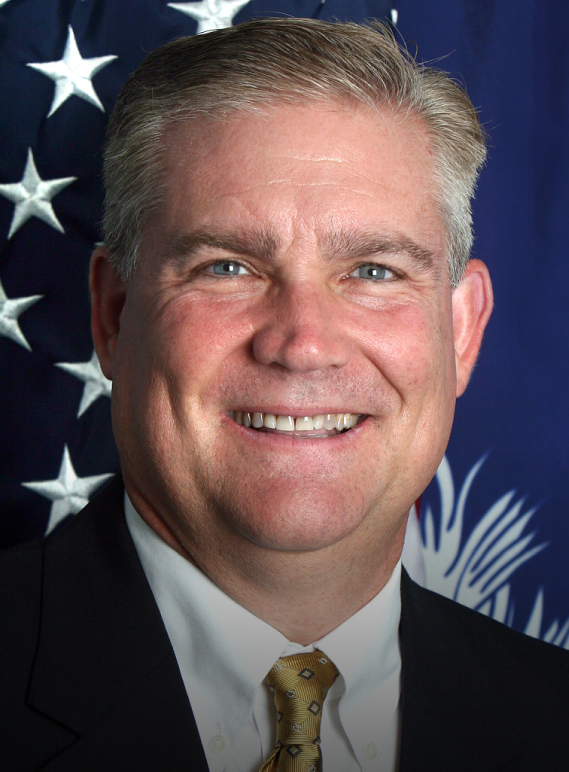
Chad Connelly
Another tactic proposed by Connelly, who is the founder of Faith Wins, one of those nonprofits, is church voter registration drives. Once members are registered to vote, their contact information becomes part of the state voter rolls and thereby directly accessible to the political campaigns. Elections depend on individuals casting individual votes. Utilizing voter rolls and additional data from UIP or i360, candidates can craft messages designed to stoke an individual’s fears or confirm their biases. In the case of Ohio Sen. Rob Portman’s re-election campaign, the ads were so tailored by i360 that no matter where the voter stood on an issue, they saw an ad implying Portman agreed.
“Secrecy and obfuscation are par for the course in politics, especially in the age of SuperPACs and dark money.”
Are these conservative groups and donors conspiring to create more conservative voters by targeting vulnerable people in order to mobilize them for the next election? It’s difficult to say with any certainty. Secrecy and obfuscation are par for the course in politics, especially in the age of SuperPACs and dark money.
Perhaps it’s just a coincidence that He Gets Us included “midterms” along with Thanksgiving and Christmas on its planning calendar. However, in a country so narrowly divided, when all it takes to potentially swing an election is a few thousand votes in a few strategic areas, the votes of conservative churchgoers could make a significant difference.
The effort by Gloo’s partners, the platform’s amazing capabilities, and even the Super Bowl expenditure could be a wonderful thing if these were offered in good faith and if the theology behind He Gets Us were as welcoming as the rebranding leads audiences to believe.
Having been taken to the highest mountain and shown all the potential new members, glitzy resources and extensive data on all the kingdoms of the world and their splendor, churches and pastors will have to decide if they will succumb to temptation to use Gloo’s platform.
Whatever they decide, they should know full well that Gloo and its associates are definitely using them.
Kristen Thomason is a freelance writer with a background in media studies and production. She has worked with national and international religious organizations and for public television. Currently based in Scotland, she has organized worship arts at churches in Metro D.C. and Toronto. In addition to writing for Baptist News Global, Kristen blogs on matters of faith and social justice at viaexmachina.com.
Related articles:

